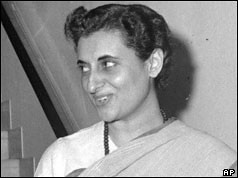When IG was made the PM in 1966 , the biggest challenges facing her were
The food crisis,
The weakening rupee,
Bad droughts and irregular monsoons
Internal congress dissent.
Mrs. IG actually won more votes than Morarji Desai and was his second defeat as he had contested after the death of JLN also. It must be admitted that there was fair degree of internal democracy in congress party still. Sulking Morarji bahi pledged his support to Indira Bhen. Notice the similarity of Dick Nixon losing twice before getting elected in 1972. Similarly Morarji Bhai had to wait sipping urine till 1979.
Anyway back to topic.
One must admit that JLN had management skills and a plan to develop sincerely India so under his first 5 yr plan he had constructed dams across major rivers, started the foundation for heavy industry Steel, Coal, and above all educational (IITs) and scientific institutions, one such was BARC to name a few. When Mrs. IG took over we were into second five year plan and most projects were in gestation periods and we had come out of a stalemate war forced on us, once again emptying the coffers. So we had to borrow heavily from foreign countries and unashamedly ask for out right grants especially on food front. US aid for text books, US PL480 funds for food imports, Colombo Plan aid, commonwealth countries Britain, Australia, New Zealand, Canada pitched in. Even Denmark, Holland were shipping free powder milk for school children etc.
Many agricultural universities just started functioning.
The pressure on Rupee was relentless as government like the current US government was heavily wedded to deficit financing, as expenditure for the plan allocations had to be found, so the best was the (Fed way) print Rupees. Incidentally Morarji Bhai was the deputy PM and finance minister, while IG Patel was minting money as secretary of Finance. Note One Rupee note was issued by secretary of Finance while all other were issued by Reserve Bank of India. The decision to devalue the Rupee in 1966 was one of the reasons that Morarji had to resign as he was removed as Finance minister.
The Indian economy was termed in those days as economy of margins or Marginal economy as 1 % of excess rainfall would be floods of disastrous proportion
or a deficit 1% rainfall would be drought of disastrous proportion. This was so because of the antiquated methods of agriculture, water resource management and not tapping (yet) the hydel potential. In these conditions the dynamic duo of C Subramaniam and Swamtnathan teamed to give impetus to green revolution that was earlier championed by
LBS. Dr. Swaminathan got Norman Borlaug to come to India and help usher the cultivation of Hybrid wheat in Punjab and other quick gestation short variety of Rice from Taiwan, I remember when my father planted "Akkulu" or "Nellore Molakalkulu" the yield was 8 to 10 bags(quintal) per acre, where as when we switched to Taichung (Native) - I The yield was 25 to 28 bags (quintal) and the crop maturity was 90 days, ideal for second crop in East Godavari.
This to get a picture of what was India in 1966, meanwhile there was lot of rsentment at Mrs IG from the elder statesmen who were taking pot shots at her. In those days Congress Chief minister wielded a lot of power and they were king makers in their own right.
To be contd
IG in 1966.

